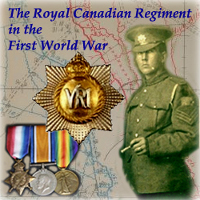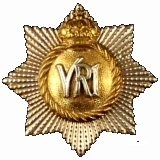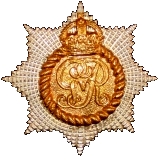
The Royal Canadian Regiment and
The First World War - 1914-1919
Cambrai 1918
By Lieut Col W.G. Wurtele, MC
Reproduced from Pro Patria No. 40, July 1979
The last 100 Days of World War I included three main attacks in audition to minor actions. These were Amiens, Arras and Cambrai. These broke the back of the Germans and led up to the Armistice on 11 November 1918.
Readers should keep in mind that the following are recollections with which I was closely involved and that other events of equal or greater importance are not covered.
CAMBRAI - this major action started on 27th of September 1918 with the 15th and 4th Canadian Divisions facing across the formidable bastion of the Canal du Nord on a comparatively narrow front. From these positions they fanned out followed by the 3rd Canadian Division. The RCR relieved the 85th Battalion in BOURLON WOOD, which they had just captured. It was a cold dark rainy night with considerable gas shelling. (It might be noted here that BOURLON WOOD was the focal point). A year earlier our former Corps Commander, General Byng had attacked and successfully held it for some weeks with considerable penetration of the German lines. Brigadier (then Lieutenant) Milton Gregg earned a Victoria Cross in this action.
By 5:30 a.m. on the 28th of September 1918 our forward companies were formed up at the forward edge of BOURLON WOOD, from right to left "D" Coy; "A" Coy and "C" Coy (which I commanded). In addition we were given 4 supporting tanks all of which seemed to fade away, presumably because of mechanical trouble, as soon as we started to move out. This was a great pity as they could have been invaluable getting through the heavy wire in front of the marching line.
For the first mile or so everything went well and there was very little opposition. We appeared to be having a repetition of the AMIENS show until we reached a crest overlooking the MARCOING LINE. All hell broke loose including being faced with three fences of heavy barbed wire. "D" Coy under the truly masterful leadership and personal courage of Lieutenant Milton Gregg got through the wire and established a gap in the enemy line for which he richly earned the Victoria Cross. I also found a fold of the ground and led No 12 platoon through the wire, but for some unexplained reason the remaining three platoons did not follow.
With only about 20 unwounded men available I realized that it would be foolhardy to make a frontal attack and so I decided we would endeavour to render assistance to Lieutenant Gregg by putting in a flanking attack. With CSM Shaw, Pte Green (the runner) and Sgt Rayner we reconnoitered and crossed a main road which was choked with Germans coming out of a six-entrance dugout and trying to squeeze into the narrow entrance of the main line trenches, Sgt Rayner, who was carrying the platoon Lewis Gun, lay down in the middle of the road, and feeding him seven magazines, he managed to inflict very heavy casualties on them. Leaving Sgt Rayner in command the remainder of my party made a sweep to the left but soon ran into a high brick wall surrounding a cemetery, the sides of which were defended by snipers.
At this stage I spotted a German Officer standing in a second storey window and taking aim at our party. Without pausing to aim I fired my service revolver and saw him fall. A lucky shot as we later found him with his face stove in. We then made a further jog to the left into 4th Division territory and came upon many bewildered Germans including some six men in a dugout. When I called down to ensure that we would not be attacked from the rear I was answered by a shot which nicked my forehead and blood spurted out. CSM Shaw heaved a Mills Bomb (No 75 grenade) down the dugout which brought out a German Staff officer who promptly tore an interesting gun metal watch with an alarm device from his wrist, and, on his knees offered it to me as a peace offering. I carried that watch right back to Canada and it certainly saved my being late for many appointments. When it wore out I could not find any watchmaker in Canada to restore it.
We sent the Germans back and proceeded to where the 4th Division was held up and I sent Green (my runner) back to report our position, and to send up the remainder of "C" Coy with the intention of mounting an attack from the rear. Nothing transpired owing largely to the confusion that followed when it was realized that 6 Officers and 32 Other Ranks had been killed; 32 Other Ranks were missing and 12 Officers, including the Commanding Officer and 189 Other Ranks were wounded. It was also feared that I was lost so after waiting about 4 hours we made our way back. During this time the CSM and I mounted a strong position to protect the 4th Division's open flank but we were spotted by the Germans who proceeded to shell us. The CSM lost his back pack, it was town off by a fragment of a shell.
We were not given much respite and on the 19th The RCR was re-organized into three companies under the Command of Lieutenant Milton Gregg and myself - I forgot the name of the other chap. Together with our runners we were ordered to reconnoiter the front line. This required our crossing a completely flat and bare 600 yards of ground. We made it up but on our return we were spotted by the Germans who opened up with rifle and machine gun fire, at first. And finally with gas shells. One of the runners was hit and we took turns helping him. This is the only time I had to sprint wearing a gas mask, an experience I would not care to repeat.
We arrived back completely exhausted and intact apart from the runner who suffered a leg wound. The reconnaissance was useless, firstly because the front line was dominated by enemy fire from a railway embankment, and secondly because our attack, next day, was some half mile to the left of where we reconnoitered.
We moved up during the night which my Company spent in a culvert. This is the only time I had the misfortune to have to chase an officer, at pistol point, to the rear. He had been sent up during the night and was mumbling how we would all be dead the next day, with devastating results on the morale of the troops. You can imagine my reaction to banner headlines in his home town paper two years later, that he had been belatedly awarded the Military Cross for his conspicuous bravery at CAMBRAI. I never knew who recommended him, or who sent me the newspaper. I could not help reflecting on how many worthy Officers had been passed over including Lieutenant Duplissie, who had ably supported Gregg two days earlier, before being killed.
At 5: 30 a. m .on the 30th of September we jumped off and my Company, or rather my former platoon No. 12 (the other three platoons still had failed to follow up and join me) made very rapid progress and reached the CHAPEL, between BLECOURT and TILLOY HILL. According to the official history this was 1000 yards deeper than any other troops reached that day, however, we were subjected to such intense MG fire from BLECOURT and TILLOY HILL that we were forced to retire. Had we had a full Company I feel we could have reached the high ground 600 yards ahead, before the Germans came up and manned it, and probably have held it until the remaining two Companies had come up to consolidate the position which overlooked an extensive sweep of over a mile. We fell back to a sunken railway where the remainder of the Battalion lay together with the stragglers of the other units.
From there were ordered forward some 15 times but by this time we were out of range of all but a few heavy batteries. The enemy MG fire was intense from the high ground and so made no progress.
Gregg and I did our best but he went back to Battalion Headquarters to explain the hopelessness of the situation when he collapsed from sheer exhaustion of the last few days and then I followed and did the same. We neither had any sleep or rest for six days .
This is a very disjointed tale, as I remember the events of the Battle of CAMBRAI which decimated The Royal Canadian Regiment but it proved to he the last really big battle of the war for the RCR and one I will never forget. My first born son was born a few days before it commenced and I was very anxious to get back to see him and my wife.
Pro Patria
- The O'Leary Collection; Medals of The Royal Canadian Regiment.
- Researching Canadian Soldiers of the First World War
- Researching The Royal Canadian Regiment
- The RCR in the First World War
- Badges of The RCR
- The Senior Subaltern
- The Minute Book (blog)
- Rogue Papers
- Tactical Primers
- The Regimental Library
- Battle Honours
- Perpetuation of the CEF
- A Miscellany
- Quotes
- The Frontenac Times
- Site Map

![]() The RCR in the Great War
The RCR in the Great War
![]() War Diary
War Diary
![]() Battle Honours
Battle Honours
![]() Battle Bars and The RCR
Battle Bars and The RCR
![]() The RCR Battle Bar Ledger (pdf)
The RCR Battle Bar Ledger (pdf)
![]() Honours and Awards
Honours and Awards
![]() Roll of Honour
Roll of Honour
![]() Prisoners of War
Prisoners of War
![]() Cemetery List
Cemetery List
![]() Cemetery Map
Cemetery Map
![]() Courts Martial
Courts Martial
![]() Officers
Officers
![]() RSMs of The RCR (1914-1919)
RSMs of The RCR (1914-1919)
![]() NCOs and Soldiers
NCOs and Soldiers
![]() An Officer's Diary (1914-1918)
An Officer's Diary (1914-1918)
![]() Recollections of a Nonagenerian (R. England) (1916-1919)
Recollections of a Nonagenerian (R. England) (1916-1919)
![]() On to Bermuda (1914-15)
On to Bermuda (1914-15)
![]() England and France 1915-1916 (Hayes; 1931)
England and France 1915-1916 (Hayes; 1931)
![]() Overseas with The Royals (1915)
Overseas with The Royals (1915)
![]() Regimental History Pamphlet (1917)
Regimental History Pamphlet (1917)
![]() Amiens (1918)
Amiens (1918)
![]() Cambrai (1918)
Cambrai (1918)
![]() Monchy-le-Preux (1918)
Monchy-le-Preux (1918)
![]() Under-aged Soldiers in The RCR
Under-aged Soldiers in The RCR
![]() Not All Were Volunteers; The RCR and the Military Service Act
Not All Were Volunteers; The RCR and the Military Service Act
![]() Sentenced to Death by Court Martial
Sentenced to Death by Court Martial
![]() The 7th Trench Mortar Battery
The 7th Trench Mortar Battery
![]() A Regimental Goat
A Regimental Goat
![]() Regiment and Family, Bermuda 1914-15
Regiment and Family, Bermuda 1914-15
![]() "March the Guilty Bastard In"
"March the Guilty Bastard In"
![]() Surrendered as Stowaway
Surrendered as Stowaway
![]() Re-Visiting the Great War Roll of Honour for The RCR
Re-Visiting the Great War Roll of Honour for The RCR
![]() Canadian Corps Trench Standing Orders (1916)
Canadian Corps Trench Standing Orders (1916)

